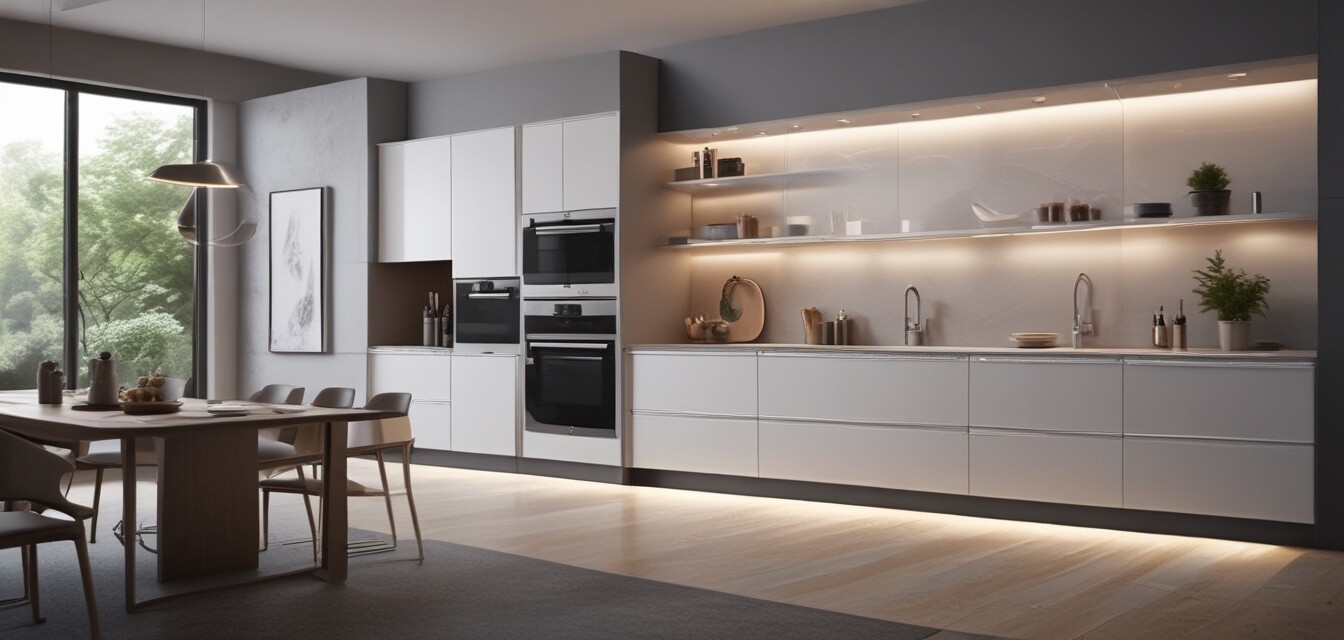
The Future of Smart Kitchen Appliances
Key Takeaways
- Smart kitchen appliances offer convenience through automation and remote control.
- Integration with mobile apps enables personalized cooking experiences.
- Energy efficiency is enhanced through smart features.
- Voice assistants are becoming integral to cooking processes.
- The trend towards IoT technology is reshaping the culinary landscape.
The kitchen is evolving, and smart technology is at the forefront of this transformation. Smart kitchen appliances are making cooking more convenient and efficient than ever before. From smart ovens to IoT-enabled refrigerators, the possibilities are endless. In this article, we'll explore how these innovations are impacting the way we cook and interact with our kitchen environments.
The rise of smart technology in kitchens
Smart technology is revolutionizing the kitchen space. Unlike traditional appliances, smart devices can connect to the internet and communicate with other gadgets, enabling users to control them remotely. Here are some key aspects of this technological shift:
- Automation: Many smart appliances automate everyday tasks, such as measuring ingredients, adjusting temperatures, and even suggesting recipes based on available items.
- Connectivity: Appliances can connect to your smartphone or tablet, allowing you to monitor and control them from anywhere, whether in your living room or across town.
- Efficiency: Smart appliances often have energy-saving modes, which can reduce electricity usage, resulting in lower bills.
Smart cooking gadgets and their benefits
Smart kitchen gadgets come in various forms, each designed to enhance the cooking experience. Below are a few popular categories and their benefits:
| Gadget Type | Description | Benefits |
|---|---|---|
| Smart Ovens | Ovens that can be controlled via an app, allowing remote programming and monitoring. | Precision cooking, energy efficiency, and convenience. |
| Smart Refrigerators | Refrigerators that have touch screens, cameras, and can track inventory. | Better organization, food waste reduction, and easy grocery management. |
| Smart Slow Cookers | Slow cookers that can be programmed and monitored from anywhere. | Flexibility in meal prep and improved meal planning. |
| Smart Cooktops | Interactive cooktops that can suggest cooking techniques and adjust temperatures. | Enhanced cooking experiences and improved accuracy. |
Voice control in the kitchen
With the rise of voice assistants like Alexa and Google Assistant, cooking has never been easier. Voice control offers chefs a hands-free way to navigate through recipes while preparing meals. Here’s how voice technology is changing kitchen dynamics:
- Recipe Assistance: Ask for step-by-step cooking instructions without touching a device.
- Timers and Reminders: Set timers and reminders through voice commands, keeping your hands free for cooking tasks.
- Control Smart Appliances: Turn appliances on or off using simple voice commands.
The impact of IoT technology
The Internet of Things (IoT) is significantly impacting how kitchen appliances interact. Here are some notable effects:
- Data Monitoring: Appliances can gather data on usage patterns, allowing personalized experiences.
- Remote Management: Users can manage their kitchen gadgets even when away from home, ensuring meals are ready when they return.
- Integration with Smart Home Systems: Kitchens can easily integrate into broader smart home ecosystems.
Trends to watch in smart kitchen appliances
As we look ahead, several trends are shaping the future of smart kitchen appliances:
- Increased Automation: Expect more appliances to offer automatic cooking and cleaning functionalities.
- AI Integration: Artificial Intelligence will help appliances learn user preferences for customized experiences.
- Sustainability: Eco-friendly appliances will gain traction in the market.
- Smart Meal Planning: Enhanced tools for meal planning and grocery list creation based on dietary preferences.
Challenges of adopting smart kitchen appliances
While smart kitchen appliances offer numerous advantages, challenges exist:
Pros
- Convenience and time-saving
- Improved cooking accuracy
- Energy efficiency
- Remote management and monitoring
Cons
- Cost of initial investment
- Potential for technical issues
- Privacy concerns regarding data collection
- Dependence on stable internet connection
Conclusion
The future of smart kitchen appliances is bright, offering countless benefits that enhance the cooking experience. With ongoing advancements in technology, the kitchen is set to become an even smarter space, making meal preparation more enjoyable and efficient. As you consider upgrading your kitchen, stay informed about the latest innovations by exploring our News and Trends section where we cover the most exciting developments in the kitchenware industry!
Tips for Choosing Smart Kitchen Appliances
- Evaluate your cooking habits and choose appliances that fit your lifestyle.
- Look for products that offer app connectivity and features to enhance usability.
- Consider energy efficiency ratings to help save on bills.
- Read customer reviews to gauge real-world performance and reliability.